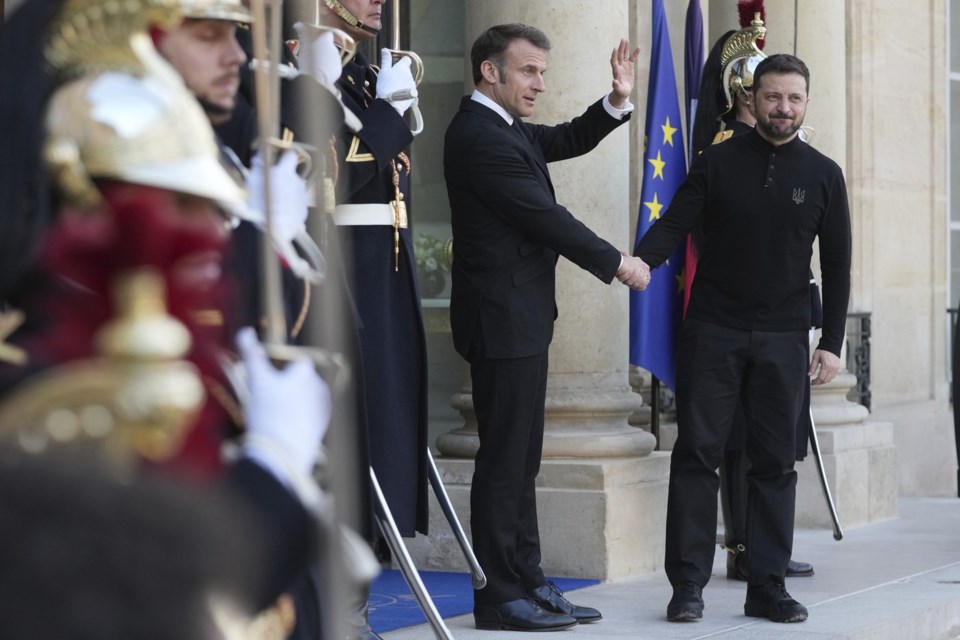PARIS (AP) — French President Emmanuel Macron said Wednesday that a proposed European armed force for possible deployment in Ukraine in tandem with an eventual peace deal could “respond” to a Russian attack if Moscow launched one.
Macron spoke after talks with Ukraine’s president and ahead of a summit in Paris of some 30 nations on Thursday that will discuss the proposed force for Ukraine that Macron suggested could be deployed in “important towns” and elsewhere.
“If there was again a generalized aggression against Ukrainian soil, these armies would, in fact, be under attack and then it’s our usual framework of engagement,” Macron said. “Our soldiers, when they are engaged and deployed, are there to react and respond to the decisions of the commander in chief and, if they are in a conflict situation, to respond to it.”
Macron, together with U.K. Prime Minister Keir Starmer, has been driving an effort to build a coalition of nations willing in one way or another to support the deployment of an armed force in Ukraine, with the aim of securing a lasting peace by dissuading Russia from attacking the country again.
Macron didn’t specify what sort of response he envisaged in the eventuality of a Russian attack.
He said the proposed European forces wouldn't be stationed on the frontlines in Ukraine, “nor be engaged on the first day opposite Russian forces.” They would “be forces that dissuade the Russians from attacking again. And by holding important towns, strategic bases, mark the clear support from several European governments and allies,” he said.
“So we are not on the frontlines, we don’t go to fight, but we are there to guarantee a lasting peace. It’s a pacifist approach,” he said. "The only ones who would, at that moment, trigger a conflict, a bellicose situation, would be the Russians if they decided again to launch an aggression.”
Macron is expecting 31 delegations around the table Thursday morning at the presidential Elysee Palace. That’s more than the French leader gathered for a first meeting in Paris in February — evidence that the coalition to help Ukraine, possibly with boots on the ground, is gathering steam, according to the presidential office.
Trump administration isn't keen
The big elephant in the room will be the country that’s missing: the United States.
U.S. President Donald Trump’s administration has shown no public enthusiasm for the coalition’s discussions about potentially sending troops into Ukraine after an eventual ceasefire to help make peace stick. Trump’s special envoy, Steve Witkoff, has dismissed the idea of a European deployment or even the need for it.
“It’s a combination of a posture and a pose and a combination of also being simplistic,” he said in an interview with former Fox News host Tucker Carlson.
That’s not the view in Europe. The shared premise upon which the coalition is being built is that Russian President Vladimir Putin’s actions in Ukraine — starting with the illegal seizure of the Crimean Peninsula in 2014 and culminating in the 2022 full-scale invasion that unleashed all-out war — shows that he cannot be trusted and that a European force could help dissuade another attack.
Ukraine's leader envisages multi-missioned force
Ukrainian President Volodymyr Zelenskyy and Macron both suggest that a foreign contingent in Ukraine could also provide military training, something allies already have been doing outside Ukraine, preparing more than 75,000 Ukrainian troops for battle against Russia’s larger and expanding military and helping to make up for some of Ukraine's losses from more than three years of intense fighting.
“Primarily, any contingent consists of combat units, but they are above all intended to control the situation, monitor it, carry out joint training, and also to prevent any desire by Russia to return with renewed waves of aggression,” Zelenskyy said at Wednesday's news conference with Macron.
European officials say that in any peace-deal scenario, Ukraine’s first line of defense against any future Russian aggression would be Ukraine’s own army. The 27-nation European Union is pressing ahead with a so-called steel “porcupine strategy” aimed at making Ukraine an even tougher nut for Russia to crack, by strengthening its armed forces and defense industry. Britain is also pledging continued military aid so Ukraine can keep fighting if peace talks fail or a ceasefire is broken.
Macron announced a new package of defense aid for Ukraine that he said was worth 2 billion euros (US$ 2.15 billion) and will include light tanks, air defense and anti-tank missiles and other weaponry and support.
Boots on the ground
The basket of possible options that European military chiefs and planners have been looking at includes an array of scenarios they have been preparing for government leaders to consider and, ultimately, green light.
A possible option that France has been pushing would be a deployment by coalition members of a sizable force in central Ukraine, somewhere along the Dnieper River, away from frontlines, said a French official who spoke on condition of anonymity about the closed-door discussions.
The official said other possible options being examined are deploying a support force even further away from the fronts, in Ukraine’s far west, or in a neighboring country.
British officials have said a force could consist of between 10,000 and 30,000 troops — which would be a considerable effort for nations that shrank their militaries after the Cold War but are now rearming.
___
AP journalists Hanna Arhirova in Kyiv, Ukraine, Jill Lawless and Emma Burrows in London and Lorne Cook in Brussels contributed.
John Leicester, The Associated Press


